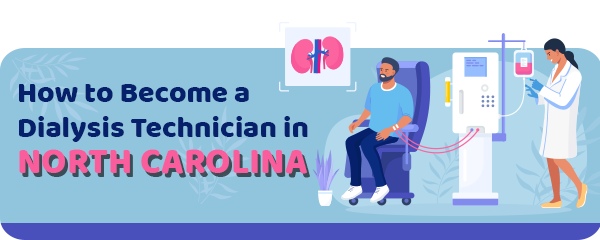Without dialysis machines and dedicated operators, many lives would be tragically shortened.
This underscores the critical role dialysis technicians play within the medical sector.
Operating a dialysis machine may not initially seem glamorous, but it offers a rewarding career for those passionate about assisting others in need.
For those seeking more information about this profession, you’re in the right place.
Continue reading to discover comprehensive details.
Article Table of Contents
Dialysis Technician Job Description in North Carolina
Selecting a profession without understanding its responsibilities is unwise.
Dialysis technicians in North Carolina work primarily with patients dealing with kidney issues.
Their core responsibility is ensuring the efficient operation of dialysis machines, adjusting them according to each patient’s specific needs.
Additional duties include:
- Monitoring the vital signs of patients
- Assisting patients throughout the dialysis procedure
- Ensuring the safety and comfort of patients
- Reviewing patients’ medical history to identify potential concerns during the procedure
- Adjusting dialysis machines to suit individual patient needs
- Administering oxygen when necessary
- Basic Cardiopulmonary Resuscitation (CPR) if required
While these tasks represent common duties, daily responsibilities may vary.
Dialysis Technician Requirements in North Carolina
In North Carolina, individuals pursuing a career in dialysis technology operate within the private sector.
Although North Carolina doesn’t impose strict training and certification requirements for dialysis technicians, practitioners must adhere to guidelines established by the Centers for Medicare and Medicaid Services (CMS).
To become a dialysis technician, candidates must meet the following CMS requirements:
- High school diploma or GED
- Training
- Credentialing
- Competency Standards of Practice
- Licensure or certification
- Gaining work experience
Certification must be secured within 18 months of commencing employment.
Aspiring dialysis technicians can choose from national-level certifications, including:
- The Nephrology Nursing Certification Commission (NNCC).
- Certified Clinical Hemodialysis Technician (CCHT) Exam.
- The Board of Nephrology Examiners Nursing and Technology (BONENT).
- Certified Hemodialysis Technician (CHT) Exam.
- The National Nephrology Certification Organization, Inc. (NNCO).
- Certified in Clinical Nephrology Technology (CCNT) Exam.
- Certified in Biomedical Nephrology Technology (CBNT) Exam.
North Carolina’s guidelines for this profession are mainly provided by the North Carolina Board of Nursing.
Candidates may be required to pass both written and practical tests.
Certified technicians must complete continuing education courses every two years and pass recertification exams every four years.
Dialysis Technician Training Schools in North Carolina
Before embarking on a career as a dialysis technician in North Carolina, you’ll need to complete an appropriate training program.
While a high school diploma or GED is a starting point, in-depth training is essential for success.
High school students should focus on:
- Biology
- Chemistry
- Medical terminology
- Anatomy
- Physiology
Comprehensive training takes place in post-secondary institutions, such as vocational schools, community colleges, and technical institutes.
These programs delve into critical topics, including:
- Principles of dialysis
- Care of patients with kidney failure
- Possible complications of dialysis
- Water treatment and dialysate preparation
- Infection control
- Safety Dialyzer reprocessing
Typically, an appropriate training program lasts around one year. Institutions with approved courses for dialysis technicians in North Carolina are available to support your educational journey.
Calhoun Community College 
This college offers a comprehensive 50-hour training program, providing students with two flexible pathways to completion:
- Online
- A traditional classroom setting.
For the online option, the tuition fee is $1,299, which includes access to e-books.
This program has a duration of 6 months, ensuring a thorough learning experience.
On the other hand, the classroom-based alternative is priced at $999, encompassing the cost of textbooks as well.
Classes are conducted on Mondays and Wednesdays, commencing at 6 p.m.
Please note that refunds are exclusively applicable to in-person classes.
Auburn University 
Auburn University presents a fully online dialysis technician program, with a tuition fee of $3,000.
This comprehensive fee includes various elements and perks.
These include:
- Interactive learning modules,
- Various learning exercises,
- Access to career resources,
- Round-the-clock mentoring support,
- Opportunities for national and state certifications,
- Self-paced learning.
Students are expected to complete their coursework within 6 months.
Alabama State University 
Alabama State University (ASU) offers an online training program geared toward preparing students for the Certified Hemodialysis Technicians (CHT) exam administered by BONENT.
This program welcomes students from other states, although it is vital to verify its alignment with the specific regulations of the student’s home state.
The tuition for this program totals $4,190, with the option of paying in installments.
It encompasses a comprehensive curriculum spanning 205 hours, accommodating flexible self-paced learning over a 12-month period.
Additionally, CPR training and certification are integrated into the course and are provided through the Red Cross.
The curriculum covers a range of critical topics, including:
- The Cardiovascular System
- The Urinary System
- The Endocrine System
- The Reproductive System
- Infection Control
- Principles of Hemodialysis
| School Name | Address |
|---|---|
| Auburn University | online |
| Alabama State University | online |
| Calhoun Community College | online |
Dialysis Technician Salary in North Carolina
Understanding your potential income is a crucial aspect when considering a career path.
Dialysis technicians typically start in entry-level positions, with an average salary of $49,000 in North Carolina.
If you’re interested in exploring which cities in North Carolina offer higher salaries for dialysis technicians, refer to the table below.
Annual Salary Range:| Location | Avg. Annual Salary |
|---|---|
| Weldon | $50,600 |
| Seaboard | $50,600 |
| Alexis | $50,100 |
| Stanley | $50,100 |
| Waco | $50,000 |
| Valdese | $49,800 |
| Winterville | $49,400 |
| Townsville | $49,400 |
| Robersonville | $49,400 |
| Advance | $48,900 |
Regional Salary in North Carolina
| Region | Employed | Avg. Annual Salary | Avg. Hourly Pay | Top 10% Annual Salary | Bottom 10% Annual Salary |
|---|---|---|---|---|---|
| Asheville, NC | 560 | $54,960 | $26.42 | $81,280 | $36,930 |
| Burlington, NC | 1,860 | $52,760 | $25.37 | $75,160 | $35,250 |
| Charlotte-Concord-Gastonia, NC-SC | 1,970 | $57,880 | $27.83 | $81,660 | $37,490 |
| Durham-Chapel Hill, NC | 1,960 | $62,290 | $29.95 | $85,430 | $38,530 |
| Fayetteville, NC | 330 | $53,370 | $25.66 | $77,330 | $35,090 |
| Goldsboro, NC | 90 | $52,440 | $25.21 | $75,840 | $36,980 |
| Greensboro-High Point, NC | 750 | $56,520 | $27.17 | $79,460 | $35,670 |
| Greenville, NC | 390 | $62,310 | $29.96 | $88,220 | $34,160 |
| Hickory-Lenoir-Morganton, NC | 290 | $57,520 | $27.66 | $100,040 | $35,730 |
| Jacksonville, NC | 160 | $48,300 | $23.22 | $73,690 | $30,530 |
| New Bern, NC | 90 | $55,070 | $26.48 | $73,280 | $33,960 |
| Raleigh, NC | 1,770 | $58,190 | $27.97 | $82,510 | $37,540 |
| Rocky Mount, NC | 80 | $58,330 | $28.04 | $79,200 | $36,920 |
| Wilmington, NC | 310 | $56,000 | $26.92 | $78,310 | $35,630 |
| Winston-Salem, NC | 940 | $59,360 | $28.54 | $81,000 | $37,000 |
* Employment conditions in your area may vary.
Frequently Asked Questions
Where Does a Dialysis Technician in North Carolina Find Work?
There are many different settings where a dialysis technician can find employment.
The following locations are the most common:
- Hospitals
- Dialysis centers
- Outpatient clinics
- Home healthcare agencies
Which Other Skills Are Required for a Dialysis Technician in North Carolina?
Dialysis techs must possess a series of skills and abilities.
These include:
- Attention to details
- Excellent communication
- Empathy
- Patience
- Compassion
- Technical mind
Do I need a license or a certification to work as a dialysis technician in North Carolina?
In North Carolina, individuals only need a certification recognized at the national level if they want to work as dialysis technicians.
Read the full guide: How to Become a Dialysis Technician



